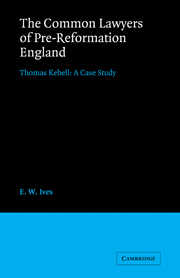Preface
Published online by Cambridge University Press: 05 November 2011
Summary
‘Divinity, Law and Physick’ are, in Joseph Addison's words, ‘the three great Professions‘. In this century, historians of England have paid much attention to the first but little by comparison to the second. We still have no history of the bar. The only comprehensive study of the judiciary is essentially biographical in interest and is well over a century old. We are still at the stage of exploration where we link a few charted features with plausible but unsurveyed invention. ‘Here be dragons!’
This neglect is not explained by uncertainty about the common law as a profession. Defined either in terms of status and public esteem or in terms of professional structure and institutions, a legal profession has existed in England from at least the fourteenth century. Nor is there doubt about the importance and influence, perhaps baleful influence, of lawyers. What has held back research has been the nature of the subject–its diffuse documentation, the lack of basic groundwork, the need to wait upon related studies (especially in legal administration), the complexities of litigation and legal work. For the earlier centuries, too, there is the even greater problem of definition. When a cleric or a doctor acts professionally, his action is self-evident. A lawyer, once away from the identifiable contexts of the court-room and the conveyancing desk, may do what is indistinguishable from the help of a friend, an employee or a member of a client's family.
- Type
- Chapter
- Information
- The Common Lawyers of Pre-Reformation EnglandThomas Kebell: A Case Study, pp. viii - xiPublisher: Cambridge University PressPrint publication year: 1983



